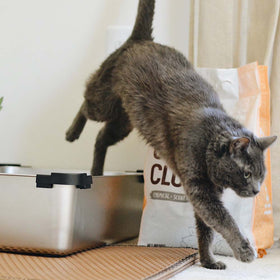
Should I Call the Vet?
Customers often ask us for advice as to whether or not they should take their dog to the vet or try the “wait and see” approach when something isn’t right. Sure, we’ve seen a lot, but we’re not vets.
To help you make that decision, we’re sharing some information from a talk hosted by Dr. Scott Bainbridge at Dundas West Animal Hospital on the subject of recognizing pet emergencies.
Poop
Not surprisingly, poop was the first topic of discussion! Many dog owners, especially new puppy owners, book vet appointments for diarrhea, but Scott says you don’t always need to do that. Many owners panic when they see blood in their dog’s stool, but drops of red blood after a bout of diarrhea are usually the result of repeated straining and are completely normal.
However, if your dog’s stool is dark and tar-like in colour, that’s a different type of blood and you should see a vet as soon as possible, as this is a sign of internal bleeding.
At the first sign of diarrhea, Dr. Bainbridge recommends the following steps:
- Fast your dog. 24 hours is an appropriate amount of time to give the bowels a chance to recover.
- Reintroduce food with a “diarrhea diet.” Start with a simple homemade concoction of white rice (cooked more than you would for a human), lean ground meat (cooked and fat drained), and low fat cottage cheese.
- Feed small, frequent meals for two days. When your dog produces a normal stool, start to mix in the “diarrhea diet” with his regular food
With these steps, the issue should clear up, but if it doesn’t, your vet will arrange to either have your dog seen or have you drop off a stool sample. Sometimes diarrhea can be caused by parasites, such as Giardia.
If your dog is also lethargic or vomiting in addition to the diarrhea, this is an emergency. Call your vet or emergency hospital.
Sometimes there’s an underlying disease causing diarrhea. If IBS/IBD are at play, flare-ups can be caused by dietary indiscretions, like new treats or a found ‘snack’ in the park, or sometimes for no apparent reason at all. Diarrhea can also be stress-related. If you have a dog that experiences chronic bouts of diarrhea, mucous coated stools, or flatulence, you should work with a vet to try to find the root cause.
Bug bites and poison ivy
If your dog is exposed to bug bites or poison ivy, it’s possible you’ll see a reaction to it. Inflammation will be most obvious in the face/jowl area, and you also might see hives. But unless your dog is having trouble breathing, don’t panic! Try administering Benadryl—your vet can advise the dosage.
Bloat
Owners of deep-chested or barrel-chested dogs should all be warned of the signs and danger of gastric torsion, also known as bloat. This is a very serious condition where the stomach actually flips and blood supply is cut off.
Signs of bloat include
- Gagging and unproductive vomiting
- Bloated bellies (sometimes)
- Pale gums
- An arched back
- Circling, looking uncomfortable, not wanting to lie down
Bloat is always an emergency. When it happens, you have a two hour window to save your dog’s life, so rush to the nearest vet.
Heat stroke
Dogs are very susceptible to heat stroke. Brachycephalic (squish faced) breeds, even more so. During extreme heat, shorten your walks and avoid strenuous activities.
Signs of heat stroke include
- Excessive panting and drooling
- Choking
- Gasping
- Blue-tinged gums
- Glassy eyes
- Coma
- Seizures
What to do? Cool your dog with lukewarm water (never cold) and transport them to the vet immediately.
Vomiting
If your dog is vomiting as well as constipated, it could be a foreign body obstruction. If your dog has an obstruction, they’ll likely also show symptoms of abdominal pain (arched back, inability to get comfortable, assuming the downward dog position). Obstructions are always an emergency.
Vomiting on its own isn’t necessarily cause for alarm, but if your dog vomits multiple times over the course of a short period, you should talk to your vet. Acute vomiting could be a sign of gastroenteritis, and it’s important for your dog to receive fluids and something to relieve the symptom(s).
Dog fights
If your dog is in a fight with another dog, check him over thoroughly for puncture wounds. They are not always obvious. Clean any wounds with antiseptic soap and visit your vet during regular hours to make sure they're healing and not infected.
Sometimes an abscess will form, which is both painful and dangerous. If you notice an abscess, see your vet for treatment.
Limping
In cases where the limp is minor, rest your dog for at least seven days. However, in cases where your dog isn’t able to put weight on the limb or they vocalize very loudly at the time of injury, it means a trip to the vet.
Seizures
Generalized (grand mal) seizures are the most common type of seizures in dogs. They involve an unconscious dog laying stiffly on their side, sometimes vocalizing, shaking, or paddling. Often they will defecate/urinate. When the seizure is over, the dog may have trouble seeing or walking, but this is rarely permanent.
As best as you can, record how long the seizure lasts. While your dog is having a seizure, clear away any objects from around them that may hurt them. You can talk to them calmly to reassure them, but do not try to touch or move your dog unless absolutely necessary for their immediate safety.
If the seizure is short and your dog seems fine afterwards, book a regular appointment with your vet. But if the seizure lasts three minutes or more or if your dog has multiple seizures in a row, it’s an emergency and your dog needs to see a vet immediately.
Choking
Signs of choking include
- Pawing at the face
- Blue-tinged gums
- Coughing
- Drooling
- Gagging
- Collapse
Here are things you can try to offer immediate help:
- Open your dog’s jaws (may need two people) and reach back to scoop out the object. Make sure to check the roof of the mouth, usually between the back teeth where sticks often become wedged.
- If your dog is small enough, you can try picking them up and shaking them gently upside down.
- Perform the Heimlich maneuver.
Even if you manage to dislodge the item from your dog’s airway, make sure to bring them to the emergency vet afterwards, as choking can cause serious complications.
Eye Injuries
For immediate relief, you can flush with saline and apply Polysporin Ophthalmic from the pharmacy. However, you should always make a vet appointment when there’s something going on with your dog’s eyes, as eyes are sensitive and it’s very easy to cause damage and make things worse.
Still in doubt?
Generally, if things are bad enough that you’re thinking of calling the vet, it’s probably time to do so. It never hurts to call and ask the question, and 24-hour online veterinary assistance exists through many vet clinics and through online vet services.
There are some signs that are always an emergency:
- Lack of response or unconsciousness
- Shallow or rapid breathing
- Collapse
- Pale or blue gums
- Severe injury or pain
- Uncontrolled bleeding
- Bloated abdomen
- Inability to urinate
- Multiple seizures or seizure that lasts longer than three minutes
If your dog shows any of these signs, take your pet to an emergency vet hospital immediately.
Central Toronto Veterinary Referral Clinic (Midtown)
Veterinary Emergency Clinic (Downtown)
Veterinary Emergency and Referral Hospital of West Toronto (Mississauga)
Animal Health Partners Emergency and Specialty Hospital (North York and Mississauga)
Toronto Veterinary Emergency Hospital (Scarborough)









